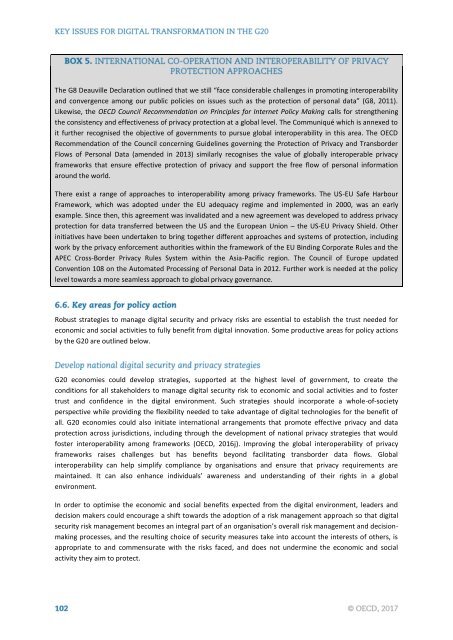KEY ISSUES FOR DIGITAL TRANSFORMATION IN THE G20
2jz0oUm
2jz0oUm
Create successful ePaper yourself
Turn your PDF publications into a flip-book with our unique Google optimized e-Paper software.
The G8 Deauville Declaration outlined that we still “face considerable challenges in promoting interoperability<br />
and convergence among our public policies on issues such as the protection of personal data” (G8, 2011).<br />
Likewise, the OECD Council Recommendation on Principles for Internet Policy Making calls for strengthening<br />
the consistency and effectiveness of privacy protection at a global level. The Communiqué which is annexed to<br />
it further recognised the objective of governments to pursue global interoperability in this area. The OECD<br />
Recommendation of the Council concerning Guidelines governing the Protection of Privacy and Transborder<br />
Flows of Personal Data (amended in 2013) similarly recognises the value of globally interoperable privacy<br />
frameworks that ensure effective protection of privacy and support the free flow of personal information<br />
around the world.<br />
There exist a range of approaches to interoperability among privacy frameworks. The US-EU Safe Harbour<br />
Framework, which was adopted under the EU adequacy regime and implemented in 2000, was an early<br />
example. Since then, this agreement was invalidated and a new agreement was developed to address privacy<br />
protection for data transferred between the US and the European Union – the US-EU Privacy Shield. Other<br />
initiatives have been undertaken to bring together different approaches and systems of protection, including<br />
work by the privacy enforcement authorities within the framework of the EU Binding Corporate Rules and the<br />
APEC Cross-Border Privacy Rules System within the Asia-Pacific region. The Council of Europe updated<br />
Convention 108 on the Automated Processing of Personal Data in 2012. Further work is needed at the policy<br />
level towards a more seamless approach to global privacy governance.<br />
Robust strategies to manage digital security and privacy risks are essential to establish the trust needed for<br />
economic and social activities to fully benefit from digital innovation. Some productive areas for policy actions<br />
by the <strong>G20</strong> are outlined below.<br />
<strong>G20</strong> economies could develop strategies, supported at the highest level of government, to create the<br />
conditions for all stakeholders to manage digital security risk to economic and social activities and to foster<br />
trust and confidence in the digital environment. Such strategies should incorporate a whole-of-society<br />
perspective while providing the flexibility needed to take advantage of digital technologies for the benefit of<br />
all. <strong>G20</strong> economies could also initiate international arrangements that promote effective privacy and data<br />
protection across jurisdictions, including through the development of national privacy strategies that would<br />
foster interoperability among frameworks (OECD, 2016j). Improving the global interoperability of privacy<br />
frameworks raises challenges but has benefits beyond facilitating transborder data flows. Global<br />
interoperability can help simplify compliance by organisations and ensure that privacy requirements are<br />
maintained. It can also enhance individuals’ awareness and understanding of their rights in a global<br />
environment.<br />
In order to optimise the economic and social benefits expected from the digital environment, leaders and<br />
decision makers could encourage a shift towards the adoption of a risk management approach so that digital<br />
security risk management becomes an integral part of an organisation’s overall risk management and decisionmaking<br />
processes, and the resulting choice of security measures take into account the interests of others, is<br />
appropriate to and commensurate with the risks faced, and does not undermine the economic and social<br />
activity they aim to protect.


